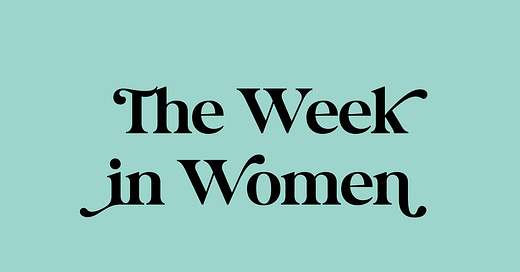Welcome to Episode 10 of The Week in Women. This week, we’re talking about ongoing feminist protests in Iran and Afghanistan, abortion back-and-forth in the US, and anti-feminism in South Korea. Plus, I’m in conversation with the incomparable Richard Reeves about his new book Of Boys and Men: Why the Modern Male is Struggling, Why it Matters, and What to Do About It. We talk about why boys and men are struggling, and why feminists should give a damn.
A transcript of the news portion of the show is below; the interview will Richard will go out in transcribed form in a few weeks. If you want The Week on Women early, you can upgrade to a paid subscription, and get it a few days before everyone else. Thank you as always for listening!
xx Jill
TRANSCRIPT
Hi, and welcome to the Week in Women. I’m your host, Jill Filipovic.
The Week in Women is a rundown of the week’s gender and women’s rights news, and it’s available for subscribers early – so head to jill.substack.com and sign up for a paid subscription if you want the Week in Women before everyone else. I'm also adding transcripts to the news section of the show. So if you don't like to listen to podcasts and yet here you are, you can also get a basic rundown of the week's gender headlines in your inbox. And again, that will come early to paid subscribers.
This week we are talking about the ongoing #MeToo trials, protests in Iran and Afghanistan for women's rights, and the state of abortion in the United States. I'm also in conversation with Richard Reeves, who is the author of a new book about boys and men and how they are following behind.
But first, the headlines.
#MeToo Trials
Three men accused of sexual assault as part of the #MeToo movement are heading to court. Harvey Weinstein’s criminal trial starts in Los Angeles on Monday, and he faces 11 charges including rape and sexual assault. Weinstein was already convicted in New York and sentenced to more than two decades behind bars, an outcome he is appealing. His legal team has also raised concerns about the living standards in his California cell, which they say is unhygienic and medieval. Also heading to trials, but in civil court, are Paul Haggis, the Oscar-winning director of the movie Crash who has also made a name for himself standing up against the Church of Scientology, and Oscar-winning actor Kevin Spacey. Both men have been accused of sexual wrongdoing, Haggis of sexually assaulting a woman in his industry, and Spacey of assaulting a 14-year-old boy who is now an adult man. The trials are being seen as a barometer for the progress of the MeToo movement.
Iran protests
Sixteen-year-old Nika Shakarami was beaten to death by police forces during protests in Iran, her family says. The official story is that she fell off of a building; her family says her injuries are more consistent with being struck repeatedly in the head. And other teenage girl, sixteen-year-old Sarina Esmailzadeh, was killed in the protests as well – reportedly beaten to death by Iranian security forces. According to Amnesty International, these girls are two of at least 23 children who have been killed by the Iranian authorities as they crack down on protesters asking for greater freedoms. The youngest in the Amnesty report was an 11-year-old boy. And at least 144 protesters have been killed so far. The state has gone out of its way to cover up these deaths, often blaming them on falls or accidents, even while security forces continue to use extreme violence against protesters out in the open. Still, thousands of brave Iranians are returning to the streets, demanding an end to mandatory hijab and the end of this tyrannical regime.
Afghanistan Protests
Afghan women are protesting for their rights, too, after 53 students, most of them women, were killed in an attack on a learning center in Kabul. The attacker opened fire in the center before blowing himself up. The center largely serves ethnic Hazaras, a long-persecuted minority in Afghanistan, and protesters are standing up both for the rights and freedoms of ethnic minorities, and for the rights of girls to attend school – something many have been banned from doing since the Taliban takeover. And of course the medieval misogynists of the Taliban have not taken kindly to women protesting. They’ve beaten women and girls, verbally abused them, and fired warning shots to force them to disperse. While some men have joined women in the streets, the crowds are overwhelmingly female. University professor Zahra Mosawi told Al Jazeera, “I have a message for those Afghan men who sit at home and just watch women on the streets. How long will you remain silent in front of all these crimes and persecution against women? If today you choose to remain silent, tomorrow you may be faced with the same persecution.”
Antifeminism in South Korea
The South Korean president sailed to victory thanks to a campaign of rank anti-feminism, intended to attract the votes of disaffected, conservative, and increasingly misogynist South Korean young men. Now in office, he has set in motion a plan to dismantle the nation’s gender equality ministry. Doing so, he says, will help women’s rights. “Abolishing the gender ministry is about strengthening the protection of women, families, children and the socially weak,” he said. The country’s liberals are pushing back, and have vowed to not let him scrap the gender equality ministry without a fight.
Abortion in the States
In US abortion news, Planned Parenthood has announced that it is opening a mobile abortion clinic in Illinois to serve women who live in states that ban the procedure. Moreso than ever before, people in the US who need abortions are being forced to travel, often for long distances. This new clinic, Planned Parenthood hopes, will increase access for women as close to home as legally possible.
In Indiana, the state supreme court has said that the state may not enforce its abortion ban for now, while the court considers the ban’s constitutionality. That’s good news for people who need abortions in the state, and clinics have now resumed making appointments. But it has been a bit of whiplash. And this is part of the problem with these slapped-together abortion bans: At least some of them are likely legally unsound, but as the courts deliberate, women and our futures are left in limbo.
In Ohio, the state is appealing an order from a judge to block the implementation of their abortion ban, which, if implemented, would criminalize abortion after six weeks of pregnancy. An appeals court will now review the decision, and determine if the law can go back into effect.
And in New Hampshire, Don Bolduc, the Republican nominee for a Senate seat, says the standard practice of discarding some embryos after in vitro fertilization procedures is “disgusting” and suggests he might support banning the practice. It’s crucial to emphasize here that, while this admission is startling, it is not in any way out of line with what every single so-called “pro-life” organization in the US supports. IVF is not currently on the top of the anti-abortion To Do list. But trust that if they continue to succeed in scaling back reproductive rights, they’ll get to it.
SHOWNOTES:
Redshirt the boys: Why boys should start school a year later than girls, by Richard V. Reeves in the Atlantic.











Share this post